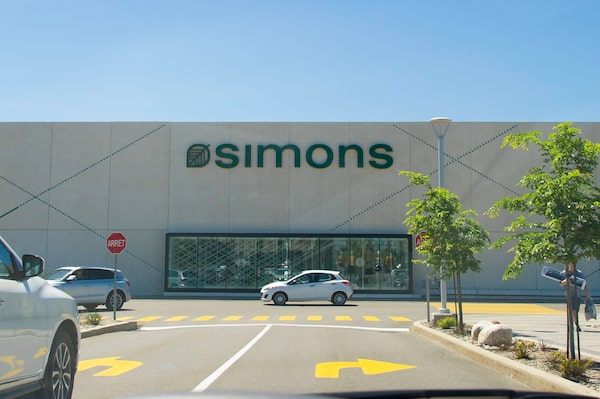There are not many family-owned Canadian department stores left that can boast of having survived the Great Depression of the 1870s. Now in its 180th year, La Maison Simons has managed to escape the same fate as Eaton’s, Simpsons and Woodward’s, which all ended up in the retailing graveyard after failing to adapt to changing consumer trends.
Quebec City-based Simons – which operates 15 stores in Quebec, Ontario, Alberta and British Columbia – will need to pull out all the stops to avoid that same cemetery now.
The coronavirus pandemic has cast a pall over the entire retail sector. But no segment of retailing is under greater threat than department stores, which have been struggling for years to remain relevant amid shifts to online sales and specialty fashion and houseware chains. U.S.-based Neiman Marcus Group last week set off what many analysts expect will be a wave of bankruptcy filings by department stores that could even claim Canada’s Hudson’s Bay Co. In a statement HBC president Iain Nairn said the company “has not considered any filing or restructuring and the speculation that we are is categorically false.”
For Simons, the pandemic struck at the worst possible time, forcing it to postpone the spring opening of a new $215-million fully automated distribution centre near the company’s head office. That investment came the heels of a decade-long expansion that saw Simons open its first stores outside Quebec. The new warehouse remains dormant at a time when having an efficient distribution chain has become more critical than ever.
President Peter Simons, a member of the fifth generation to run the family-owned retailer, has clung jealously to his chain’s independence, refusing past offers from outside investors and rejecting proposals to take the company public. Analysts say that has allowed Mr. Simons to indulge in expensive store decors and take risks that investor-owned retailers would avoid.

A Simons department store stands at Les Promenades shopping centre in Gatineau, Que., on June 2, 2018.Nathalie Madore/The Canadian Press
“If Simons was a publicly traded company, there is no way they would be doing those things,” Craig Patterson, editor-in-chief of Retail Insider, said of the company’s art-laden stores, replete with solar-panelled roof tops. “But to keep going, they’re probably going to require some kind of outside investor and that will require surrendering some autonomy.”
The company declined to make Mr. Simons available for an interview. But Le Journal de Montréal last week reported that all options are on the table for Simons, including a capital restructuring, as lenders grow increasingly skittish about extending further credit.
In 2018, Mr. Simons turned to the Quebec government and pension fund manager Caisse de dépôt et placement du Québec to finance the distribution centre after the company’s long-time lenders, Bank of Montreal and National Bank of Canada, deemed the project too risky.
Simons “has been with the Bank of Montreal for 150 years. We’re their oldest customer,” Mr. Simons told La Presse in 2018. “But for sure they won’t be able to follow us in this project because there are too many risks for them. It’s too much. So, it requires different actors.”
The Quebec government extended an $81-million loan to Simons, while the Caisse ponied up $27-million in exchange for an undisclosed number of shares in the company. The provincial economic development agency, Investissement Québec, injected an additional $17-million.
Mr. Simons, who had been critical of foreign online behemoths that escape Canadian tax laws, justified the massive investment as part of an “all-in” strategy aimed at “going to war” with Amazon. But industry observers suggested the move may have overextended the company, since it came so closely after Simons spent an estimated $200-million to open six stores outside Quebec. Several of the outlets, which include Mississauga’s Square One shopping mall and Ottawa’s Rideau Centre, are said to have performed below expectations.
Simons also erred in opening a store in downtown Calgary in 2017, just as the city’s core was seeing rising office vacancies because of a prolonged downturn in the oil and gas sector. That downturn has turned into a bloodbath, making downtown Calgary a wasteland for retailers. Simons has also embarked on costly renovation projects at a few of its existing stores and announced plans to open a store at suburban Montreal’s Fairview Pointe Claire mall in 2021.
An increase in online sales has helped offset some losses incurred from the closing of its bricks-and-mortar stores during the pandemic shutdown. But Simons faces steep odds in coming months even as it begins to reopen its Quebec stores outside Montreal on May 19. Cash-strapped consumers will not be returning to previous spending habits any time soon.
Still, after surviving every economic downturn since 1840, it would be a mistake to count Simons out now. Mr. Simons is widely hailed as retailing visionary, with a knack for anticipating consumer trends and keeping customers happy. The Simons brand is an institution in Quebec and its flagship downtown Montreal store remains a destination for locals and tourists alike
The question is whether Simons will need to sacrifice its soul to survive this crisis.
“Peter is wise to remain as private as possible. Investors don’t like risk. Investors just want a stable return,” said Doug Stephens, founder of Toronto-based consultants Retail Prophet. “He may have to make some very daring decisions in the near future."
Your time is valuable. Have the Top Business Headlines newsletter conveniently delivered to your inbox in the morning or evening. Sign up today.
 Konrad Yakabuski
Konrad Yakabuski